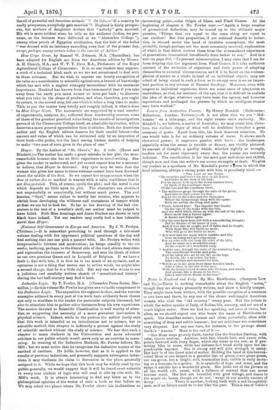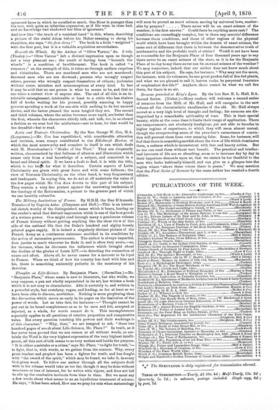Notes in England and Italy. By Mrs. Hawthorne. (Sampson Low
and Co.)—There is nothing remarkable about the English " notes,' though they are always pleasantly written, and show a kindly temper. They might have been written, with the possible exception of a sentence or two here and there, by any one of the clever well-taught American women who visit the "old country" every year. But the letters in which the writer speaks of Italy, of Italian life, scenery, and art are of a much higher order. Here we find her speaking, not once or twice, but often, as we should expect one who bears the name of Hawthorne to speak. She describes nature, human and other, powerfully, often with something of deep and subtle humour ; her art criticisms aro sometimes very eloquent. Let any one turn, for instance, to the passage about Guido's "Aurora." Here is the end of it :— " One Hour steps gravely forth, fateful like the Grecian Destiny, with calm, classic contour. Another, with fair, blonde hair, and azure robe, points forward with ivory finger, which she turns to the rest, ILS if pro- mising bliss to come, while her delicate feet tread airily upon the im- ponderable vapours. She is strong and will give strength to many. Her heir is of the finest mist of amber. Holding the hand of this heaven- robed Hour is one draped in a peculiar tint of groon,—not grass-green, nor sea-green, but a bright, cool, tourmaline hue, visible in early morn- ing at a fountain in a grotto. It is symbolic of hope and trust, and the
shape it enfolds has a wonderful grace. She looks out of the picture at all the world, soft, sweet, with a fullness of content that can never become scant. Her feet are beautiful with glad tidings, and dance to
the music she hears, though we do not, ' wrapt in our muddy vesture of decay.' There is another, looking back with a sad thoughtful- ness, as if no future could be to her like the past. This is one of Guido's
upturned faces in which he excelled so much. One Hour is younger than the rest, with quite an infantine expression, as if life were in close bud, and no knowledge had shadowed her bliss of ignorance."
And how like "the touch of a vanished hand" is this, where, describing a picture of the sinful Adam before his Maker seeming to shrug his shoulders, she says, "the fist shrug ! " The book is a little " weighted " with the first part, but it is a valuable acquisition nevertheless.



































 Previous page
Previous page